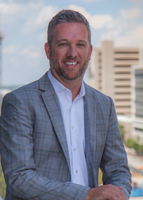The foodservice industry is a relationship business. It is said so often that it almost sounds cliché. But one foodservice consultant is banking on the relationships he’s developed over the past 20 years combined with his energy and work ethic to serve as the foundation for success for a new consulting firm.
 Kris MorphisIndeed, during the midst of a pandemic, not everyone would walk away from a role as a principal at a consulting firm that’s more than 40 years old to start a new company but that’s exactly what Kris Morphis is doing. He left Foodesign Associates to start KRM Foodservice Design & Consulting.
Kris MorphisIndeed, during the midst of a pandemic, not everyone would walk away from a role as a principal at a consulting firm that’s more than 40 years old to start a new company but that’s exactly what Kris Morphis is doing. He left Foodesign Associates to start KRM Foodservice Design & Consulting.
“I needed a new challenge. It was a time in my life where I wanted to go out and do my own thing. I am really excited about it,” Morphis says. “My old firm and I made a commitment that my clients would continue to work with me if they are willing. I’ve built a ton of relationships over the years and have confidence in those relationships. We are raring to go and have a number of projects on the books already.”
After earning a college degree in interior design, Morphis spent 10 years working in restaurants before joining Food Design Associates in 2000 in a CAD/production role. “I understand food flow and what works in a restaurant,” he says. “With my schooling and background, that opportunity was the right fit when it came up.”
In 2006 when one of the firm’s majority partners retired, Morphis bought his stock and assumed the role of partner himself. “I did not know how to run a business. It was sink or swim and it was up to me to learn,” he recalls. “I had employees that were older than me and had to earn their respect by working hard and always being there for them. I always prided myself on that. And the business doubled in size between 2006 and 2020 and I was proud of that, too. When you own the business, a mistake can cost you $10,000. But I love that pressure.”
In his previous position at Food Design Associates, Morphis described his role as being more of a managing principal. That will change with his new firm. “I am going to have a more hands on approach to my projects and I want to get back to that,” he says. “We don’t have to recreate the wheel. There will be some changes in how I conduct things and manage things. And that excites me, too.”
While developing his book of business, Morphis will focus on non-commercial projects such as school foodservice, corporate feeding, healthcare, club foodservice and the like. “This kind of work is energetic and fun,” he says. “My former partner works with a lot of government and military work and I don’t see our company targeting that in the future. That’s not where my relationships lie. In talking with a lot of clients, they are going to push work to my new company because of my relationship with them. That’s what it’s all about.”
Morphis is not going it alone, either. Emily Sandow serves as project director for KRM. Sandow joined Food Design Associates in 2017, serving as project director for strategic planning. Sandow’s background is in college foodservice, having previously served as operations manager for Georgia Southern University. Sandow will work on operations consulting, strategic planning, menus and reviewing layouts from an operational perspective. “She’s been hands on behind the scenes so she can see this looks good, but it really won’t work,” he says. In addition, Donna Morphis, Kris’ mom, will handle general accounting for the new firm.
Morphis will remain active in various industry associations, including the Society for Hospitality and Foodservice Management, National Association for College and University Food Services, National Association of College Auxiliary Services and the Foodservice Consultants Society International – The Americas. In fact, Morphis is already making partnerships with other consulting groups around the country to work together to help each other out. “I’ve had people reach out to me to see if I needed any help, and that’s a great thing about being part of FCSI. We all help each other out.”
Morphis remains well aware of the fact he is launching a new company into an economy weakened by a once in a hundred years pandemic, but he will not let that dampen his entrepreneurial spirit. “Yes, I am nervous about it, but the economy was strong before the pandemic and people want to go to work,” he says. “In the last recession our company saw a little delay in the slowdown of work. But the good thing about my new company and my past company, we are not pigeonholed into one segment. We shall see. My gut says we will be ok. The good thing about starting fresh is our expenses are low right now and we are building as needed. It’s nice to start fresh and to have work to start out with.”



